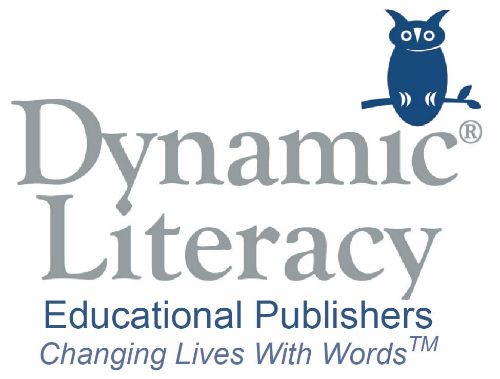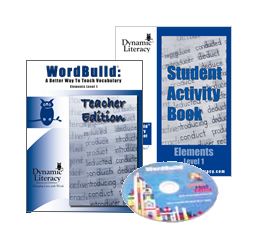 Dynamic Literacy is a company with which I was wholly unfamiliar prior to this review, but I am so happy that I have become acquainted with them now! WorldBuild: Elements, Level 1 Set (Includes WordBuild the Game), $99.99, is one of the most rigorous, but most enjoyable "root family" programs that I have ever used. From the first moment I saw the sample, I was hooked!
There are three components to this program. The Student Activity Book is a 156 page book covering 25 Latin and Greek root families. The roots are taught through activities that resemble pencil puzzle word games, like Magic Squares (there are four activities for each root). If you look at the sample, you'll see what I mean (and I mean it in the best way possible). Some kids learn roots through rote memorization, and it works really well for them. I am one of them. Others...not so much. Nicholas (12) is one of the latter variety. He does, however, love pencil puzzles. That's why I loved this product on sight. When I got it home, I loved it even more. I'm getting ahead of myself, though.
Dynamic Literacy is a company with which I was wholly unfamiliar prior to this review, but I am so happy that I have become acquainted with them now! WorldBuild: Elements, Level 1 Set (Includes WordBuild the Game), $99.99, is one of the most rigorous, but most enjoyable "root family" programs that I have ever used. From the first moment I saw the sample, I was hooked!
There are three components to this program. The Student Activity Book is a 156 page book covering 25 Latin and Greek root families. The roots are taught through activities that resemble pencil puzzle word games, like Magic Squares (there are four activities for each root). If you look at the sample, you'll see what I mean (and I mean it in the best way possible). Some kids learn roots through rote memorization, and it works really well for them. I am one of them. Others...not so much. Nicholas (12) is one of the latter variety. He does, however, love pencil puzzles. That's why I loved this product on sight. When I got it home, I loved it even more. I'm getting ahead of myself, though.
 The Teacher's Edition (which is essential to this program) is a 336 page guide that not only tells you how to teach each root, but answer keys, units that review each root, weekly root "check-ups," and a mini-dictionary.
WordBuild the Game teaches word building using the formula prefix + root + suffix, allowing students to use over 200 roots and 18,000+ words. It allows for up to 99 players, so while only one student can use the Student Activity Book, the whole family can play WordBuild the Game!
The Teacher's Edition (which is essential to this program) is a 336 page guide that not only tells you how to teach each root, but answer keys, units that review each root, weekly root "check-ups," and a mini-dictionary.
WordBuild the Game teaches word building using the formula prefix + root + suffix, allowing students to use over 200 roots and 18,000+ words. It allows for up to 99 players, so while only one student can use the Student Activity Book, the whole family can play WordBuild the Game!
Nicholas (12) and Dynamic Literacy
I will confess that at first Nicky was not as enthusiastic about this program as I would have liked. The reason? It's kind of hard! Let me explain. Of my four kids, Nicky is my one non-voracious reader. Compared to other people's kids, Nicky still reads a lot, but compared to my other three kids (and myself, I suppose), who sometimes read multiple novels a day, Nicky doesn't read that much. The reasons are several: he has ADHD, he is ridiculously picky, he doesn't have access to a Kindle Fire (which allows the others to read far into the night - judge me later, this is about Dynamic Literacy), and he would sometimes just prefer to stare off into space than to read. And I'm okay with that (no, I really am). The problem is, though, that I have noticed that his vocabulary is not up to par (and I am *not* okay with that. I am all about the sesquipedalian lifestyle. Well, that and a serious cheek highlight.). The vocabulary comes from reading. The number of words to be gained from this program will go a long way toward remedying his deficiency. As anyone knows, learn one word, and you learn one word. Learn a root, and you learn *dozens* of words.
As I started to say, though, this program does not fool around. It is expected that you have some familiarity with roots already. I would have expected Nicky to have this familiarity. He has done root work before. With Nicky, though, because of his his issues (OCD, ADHD, Tourette's), I have to expect that he will forget that he has learned something until he suddenly remembers it. What is so wonderful about the program, though, is that it provides something of a "roots boot camp" for students who aren't quite up to snuff on their roots. That's the "Affix Adder" that you see in the second picture below. It was exceptionally helpful for Nicky at the beginning of this program. The left picture shows the second root "exercise" that Nicky did - a Magic Square. It was absolutely the format of the exercise that got Nicky hooked on the program. He loves magic squares in his Dell puzzle books, so seeing one in this book made him want to do this exercise. It was the ideal starting point.

Although I did show Nicky the computer game, he prefers the workbooks. Maybe because of his OCD, he is definitely a workbook homeschooler (with the exception of Math). He likes to see the end in sight - to know that he has *this page* to do and then he can move on to the next subject. The game is sort of a misnomer, as it really is a word building tool. To the strains of classical music, the "player" moves parts of words around (morphics) to form actual words. If you manage to create a real word, the word meaning is shown and a chime is heard. It is a really neat concept, but is not something that is up Nicky's alley. I know it is something that Mary-Catherine (10) is going to LOVE, though. I will probably introduce her to it in the fall.
If your child needs a roots program, is in junior high or above, and loves pencil puzzle-style learning, Dynamic Literacy is *definitely* worth a look! Be sure to click the banner below to see how other Crew members used WordBuildOnline and the younger version of the roots program, as well as the same level we reviewed.







No comments:
Post a Comment